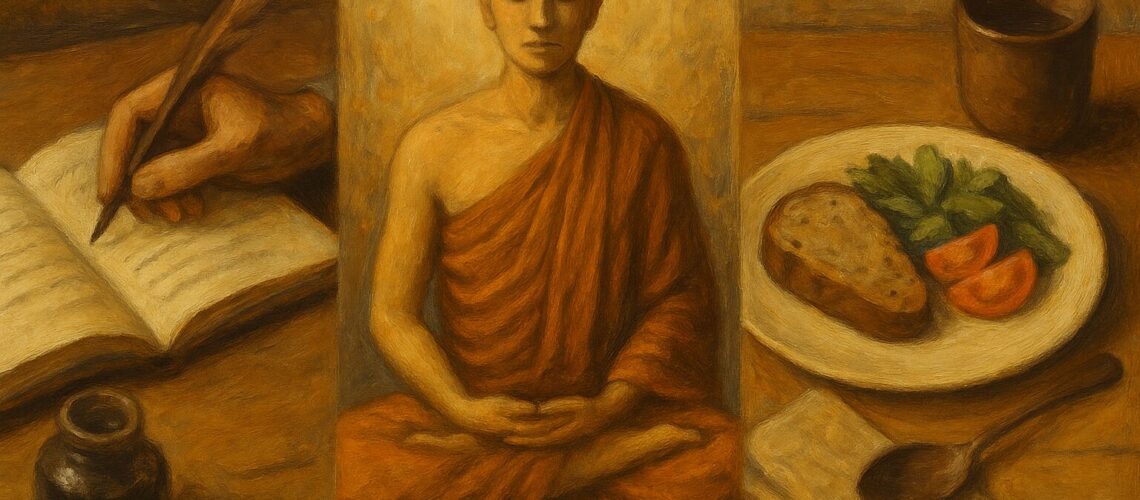A Triad of timeless wisdom
When life feels overwhelming, we often turn to the latest trends for relief — new apps, new hacks, new therapies. Yet across centuries and cultures, people have always faced the same question: How do we stay sane enough to love life?
Three ancient traditions — Stoic, Buddhist, and Epicurean — still offer practices as fresh today as when they were first taught. Each provides a way of steadying the emotional core, polishing the lens, and keeping appreciation alive.
1. Stoic Journaling — Ordering the Mind
The Stoics of ancient Rome believed that much of suffering comes not from events themselves, but from our judgments of them. Marcus Aurelius, emperor and philosopher, carried a private journal where he confronted his own thoughts. That journal became Meditations, a timeless record of resilience.
Stoic journaling is not about recording events but examining reactions. Why did I get angry? Why did I envy? What truly matters? By putting thoughts on paper, we untangle them, and in the untangling, we recover calm.
Modern practice: Each night, write down one irritation and one gratitude. Look at them side by side. Notice how the irritation shrinks when placed next to what is enduringly good. The act itself steadies the mind.
The Stoic gift: clarity. The practice turns fog into form, chaos into order. With clarity, appreciation returns.
2. Buddhist Mindfulness — Returning to Presence
Buddhist teachers, from the Buddha himself onward, spoke of the wandering mind as the root of much suffering. We leap into past regrets, lunge toward future fears, and miss the only place we actually live: the present.
Mindfulness is the practice of returning, gently, to now. To breath, to sensation, to the moment as it is. The practice is deceptively simple: notice, return, notice, return. But the effect is profound. The storm inside quiets, and suddenly a bird sings, sunlight warms, life reveals itself again.
Modern practice: Take a five-minute walk without headphones, phone, or task. Simply notice. The rhythm of steps, the texture of air, the play of shadow. Each time the mind wanders, return. It is in these tiny acts of return that calm and appreciation revives.
The Buddhist gift: presence. Life itself becomes visible again, not as a backdrop but as a miracle.
3. Epicurean Savoring — Choosing Simple Pleasures
Epicurus is often misrepresented as a prophet of indulgence. In truth, he taught that the deepest pleasures are simple ones: friendship, food, freedom from fear. His garden school was a place of conversation, laughter, modest meals — pleasures within reach of all.
Epicurean sanity comes from savoring what is already here, not endlessly craving what is not. It is the discipline of enough. And in enough, we find abundance.
Modern practice: Share a meal with a friend without rush. Put the phone aside. Taste each bite. Let conversation meander. In a single evening, you practice Epicurean therapy — gratitude for the simple, appreciation of living.
The Epicurean gift: contentment. Life feels full because we stop measuring it by what is missing.
A Thread Through All Three
- The Stoic gives us clarity.
- The Buddhist gives us presence.
- The Epicurean gives us contentment.
Together they form a triad of sanity, tested across centuries. None promises escape from hardship. Each promises steadiness within hardship, and steadiness is what makes appreciation possible.
Closing Thought
We don’t have to live like ancient philosophers to inherit their wisdom. We simply need to adapt their practices: write, return, savor.
Because sanity is fragile, and appreciation is fleeting. Without practices, both slip away. With them, both endure.
Practice clarity, presence, and contentment. They’re not relics of the past, but timeless medicines — helping us stay sane enough to love the rare, brief, wondrous gift of being alive.
For more like this, visit the broader project at life-savor.com, or explore the Life Savor book itself.
To learn more about Life Savor’s philosophy,
read Life Savor: Treasuring Our Gift of Life by Erik Victor Reed.








